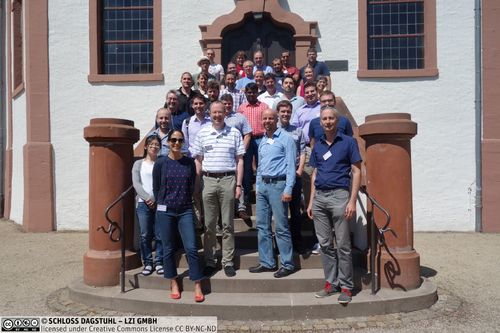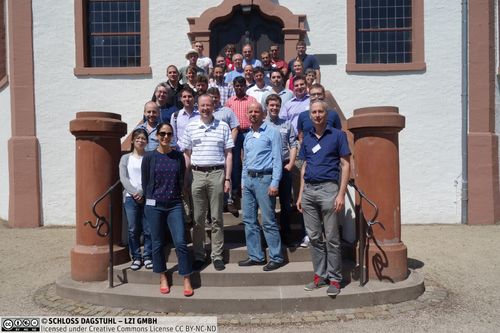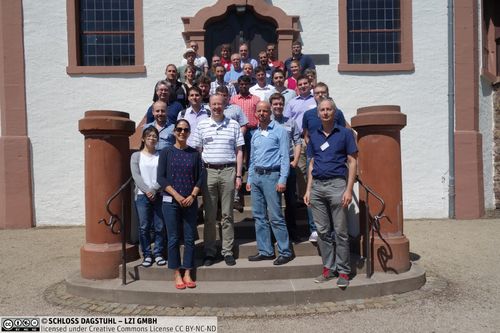Dagstuhl-Seminar 16271
Algorithmic Foundations of Programmable Matter
( 03. Jul – 08. Jul, 2016 )
Permalink
Organisatoren
- Sándor Fekete (TU Braunschweig, DE)
- Andréa Richa (Arizona State University - Tempe, US)
- Kay Römer (TU Graz, AT)
- Christian Scheideler (Universität Paderborn, DE)
Kontakt
- Annette Beyer (für administrative Fragen)
Dagstuhl Seminar Wiki
- Dagstuhl Seminar Wiki (Use personal credentials as created in DOOR to log in)
Gemeinsame Dokumente
- Dagstuhl Materials Page (Use personal credentials as created in DOOR to log in)
Impacts
- A Stochastic Approach to Shortcut Bridging in Programmable Matter : article in DNA Computing and Molecular Programming, LNCS 10467 : pp. 122-138 - Arroyo, Marta Andres; Cannon, Sarah; Daymude, Joshua J.; Randall, Dana; Richa, Andrea W. - Berlin : Springer, 2017 - (Lecture notes in computer science ; 10467 : article).
- Algorithmic Foundations of Programmable Matter : Dagstuhl Seminar 16271 : article - Fekete, Sandor P.; Richa, Andrea W.; Römer, Kay; Scheideler, Christian - New York : ACM, 2017 - (SIGACT news ; 48. 2017, 2).
- Forming Tile Shapes with a Single Robot : article in EuroCG 2017, Malmö, Sweden, April 5 : 7, 2017 : pp. 9-12 - Gmyr, Robert; Kostitsyna, Irina; Kuhn, Fabian; Scheideler, Christian; Strothmann, Thim - Malmö : University, 2017 - (European Workshop on Computational Geometry 2017 ; article).
- Forming Tile Shapes with Simple Robots : rticle in LNCS 11145 : International Conference on DNA Computing and Molecular Programming, DNA 2018 - Gmyr, Robert; Hinnenthal, Kristian; Kostitsyna, Irina; Kuhn, Fabian; Rudolph, Dorian; Strothmann, Thim; Scheideler, Christian - Berlin : Springer, 2018. - pp. 128-138 - (Lecture notes in computer science ; 11145 : article).
Programmable matter refers to a substance that has the ability to change its physical properties (shape, density, moduli, conductivity, optical properties, etc.) in a programmable fashion, based upon user input or autonomous sensing. The potential applications are endless, e.g., smart materials, autonomous monitoring and repair, or minimal invasive surgery. Thus, there is a high relevance of this topic to industry and society in general, and therefore a lot of research has been invested in the past decade to fabricate programmable matter. However, fabrication is only part of the story: without a proper understanding of how to program the matter, complex tasks such as minimal invasive surgery will be out of reach.
The aim of the Dagstuhl seminar is to bring together researchers from the algorithms community with selected experts from robotics and distributed systems in order to set a solid base for the development of models, technical solutions, and algorithms that can control programmable matter. Both communities will benefit from such a meeting for the following reasons:
- Algorithmic work on programmable matter is still in its infancy. While passive models in which external forces are applied to program matter have already been investigated for more than a decade, active models in which the matter contains actuation mechanisms for reprogramming have emerged only recently and still need to be validated by realizing the proposed particles and performing experiments, which requires interactions with experts from distributed systems and robotics.
- The distributed systems and robotics communities have already dealt with robotic swarms and modular robotics for a long time. However, so far no mechanisms are available that scale to hundreds or thousands of individual units. This is not just due to mechanical problems but also due to the lack of scalable algorithms, which require algorithms experts to be done right. Therefore, the seminar will not only gather a critical mass of people from the algorithms community in order to boost algorithmic research on programmable matter, but also make an effort to encourage collaborations between the algorithms community on one side and the distributed systems and robotics community on the other side.
For a fruitful and targeted discussion, the Dagstuhl seminar will focus on particularly relevant problems for programmable matter including (but not limited to) coating, shape formation, and bridging problems. Also, instead of just having talks in which participants present their previous related work, we plan to have survey talks and interdisciplinary working sessions.
Programmable matter refers to a substance that has the ability to change its physical properties (shape, density, moduli, conductivity, optical properties, etc.) in a programmable fashion, based upon user input or autonomous sensing. The potential applications are endless, e.g., smart materials, autonomous monitoring and repair, or minimal invasive surgery. Thus, there is a high relevance of this topic to industry and society in general, and much research has been invested in the past decade to fabricate programmable matter. However, fabrication is only part of the story: without a proper understanding of how to program that matter, complex tasks such as minimal invasive surgery will be out of reach. Unfortunately, only very few people in the algorithms community have worked on programmable matter so far, so programmable matter has not received the attention it deserves given the importance of that topic.
The Dagstuhl seminar "Algorithmic Foundations of Programmable Matter" aimed at resolving that problem by getting together a critical mass of people from algorithms with a selection of experts from distributed systems and robotics in order to discuss and develop models, algorithms, and technical solutions for programmable matter.
The aim of the proposed seminar was to bring together researchers from the algorithms community with selected experts from robotics and distributed systems in order to set a solid base for the development of models, technical solutions, and algorithms that can control programmable matter. The overall mix worked quite well: researchers from the more practical side (such as Julien Bourgeois, Nikolaus Correll, Ted Pavlic, Kay Römer, among others) interacted well with participants from the theoretical side (e.g., Jennifer Welch, Andrea Richa, Christian Scheideler, Sándor Fekete, and many others). Particularly interesting to see were well-developed but still expanding areas, such as tile self-assembly that already combines theory and practice (with visible and well-connected scientists such as Damien Woods, Matt Patitz, David Doty, Andrew Winslow, Robert Schweller) or multi-robot systems (Julien Bourgeois, Nikolaus Correll, Matteo Lasagni, André Naz, Benoît Piranda, Kay Römer).
The seminar program started with a set of four tutorial talks given by representatives from the different sets of participants to establish a common ground for discussion. From the robotics and distributed system side, Nikolaus Correll and Julien Bourgeois gave tutorials on smart programmable materials and on the claytronics programmable matter framework respectively. From the bioengineering side, Ted Pavlic gave a tutorial on natural systems that may inspire programmable matter. From the algorithmic side, Jacob Hendricks gave a tutorial on algorithmic self-assembly. In the mornings of the remaining four days, selected participants offered shorter presentations with a special focus on experience from the past work and especially also open problems and challenges. Two of the afternoons were devoted to discussions in breakout groups. Four breakout groups were formed, each with less than 10 participants to allow for intense interaction. Inspired by a classification of research questions in biology into "why?" and "how?" questions presented in Ted Pavlic's tutorial, the first breakout session was devoted to the "why?" questions underpinning programmable matter, especially also appropriate models of programmable matter systems (both biological or engineered) suitable for algorithmic research. The second breakout sessions towards the end of the seminar was devoted to a set of specific questions given by the organizers that resulted from the discussions among the participants, they included both research questions and organizational questions (e.g., how to proceed after the Dagstuhl seminar). After each of the two breakout sessions, one participant of each of the four breakout groups reported back the main findings of the discussions to the plenum, leading to further discussion among all participants. One of the afternoons was devoted to a hike to a nearby village, where the participants also visited a small museum devoted to programmable mechanical musical devices.
The seminar was an overwhelming success. In particular, bringing together participants from a number of different but partially overlapping areas, in order to exchange problems and challenges on a newly developing field turned out to be excellent for the setting of Dagstuhl - and the opportunities provided at Dagstuhl are perfect for starting a new community.
Participants were enthusiastic on a number of different levels:
- Meeting experts from other fields provided additional insights, challenges and focus when considering work on programmable matter.
- Interacting with colleagues in a close and social manner gave many starting points for continuing collaboration.
- Getting together in a strong, large and enthusiastic group provided the opportunity to plan a number of followup activities.
The latter include connecting participants via a mailing list, the planning and writing of survey articles in highly visible publication outlets, and a starting point for specific scientific workshops and conferences.
Participants were highly enthusiastic about the possibility of another Dagstuhl workshop in the future; organizers will keep the ball rolling on this - most likely, for an application in the coming spring, so that some more details can be worked out in the meantime.
 Sándor Fekete, Andréa Richa, Kay Römer, and Christian Scheideler
Sándor Fekete, Andréa Richa, Kay Römer, and Christian Scheideler
- Luca Becchetti (Sapienza University of Rome, IT) [dblp]
- Julien Bourgeois (FEMTO-ST Institute - Montbéliard, FR) [dblp]
- Sarah Cannon (Georgia Institute of Technology - Atlanta, US) [dblp]
- Ioannis Chatzigiannakis (Sapienza University of Rome, IT) [dblp]
- Nikolaus Correll (University of Colorado - Boulder, US) [dblp]
- David Doty (University of California - Davis, US) [dblp]
- Yuval Emek (Technion - Haifa, IL) [dblp]
- Sándor Fekete (TU Braunschweig, DE) [dblp]
- Robert Gmyr (Universität Paderborn, DE) [dblp]
- Heiko Hamann (Universität Paderborn, DE) [dblp]
- Jacob Hendricks (University of Wisconsin - River Falls, US) [dblp]
- Stephan Holzer (MIT - Cambridge, US) [dblp]
- Irina Kostitsyna (Free University of Brussels, BE) [dblp]
- Dominik Krupke (TU Braunschweig, DE) [dblp]
- Fabian Daniel Kuhn (Universität Freiburg, DE) [dblp]
- Matteo Lasagni (TU Graz, AT) [dblp]
- Othon Michail (CTI - Rion, GR) [dblp]
- Venkateswarlu Muni (Ben Gurion University of the Negev - Beer Sheva, IL) [dblp]
- André Naz (FEMTO-ST Institute - Montbéliard, FR) [dblp]
- Pekka Orponen (Aalto University, FI) [dblp]
- Matthew J. Patitz (University of Arkansas - Fayetteville, US) [dblp]
- Theodore P. Pavlic (Arizona State University - Tempe, US) [dblp]
- Benoît Piranda (FEMTO-ST Institute - Montbéliard, FR) [dblp]
- Andréa Richa (Arizona State University - Tempe, US) [dblp]
- Trent Rogers (University of Arkansas - Fayetteville, US) [dblp]
- Kay Römer (TU Graz, AT) [dblp]
- Nicola Santoro (Carleton University - Ottawa, CA) [dblp]
- Christian Scheideler (Universität Paderborn, DE) [dblp]
- Arne Schmidt (TU Braunschweig, DE) [dblp]
- Robert Schweller (The University of Texas - Pan American - Edinburg, US) [dblp]
- Thim Frederik Strothmann (Universität Paderborn, DE) [dblp]
- Sebastian von Mammen (Universität Augsburg, DE) [dblp]
- Jennifer L. Welch (Texas A&M University - College Station, US) [dblp]
- Andrew Winslow (Free University of Brussels, BE) [dblp]
- Damien Woods (California Institute of Technology - Pasadena, US) [dblp]
- Yukiko Yamauchi (Kyushu University - Fukuoka, JP) [dblp]
Verwandte Seminare
Klassifikation
- artificial intelligence / robotics
- data structures / algorithms / complexity
- networks
Schlagworte
- distributed algorithms
- distributed systems
- robotics
- self-organization
- programmable matter




 Creative Commons BY 3.0 Unported license
Creative Commons BY 3.0 Unported license
